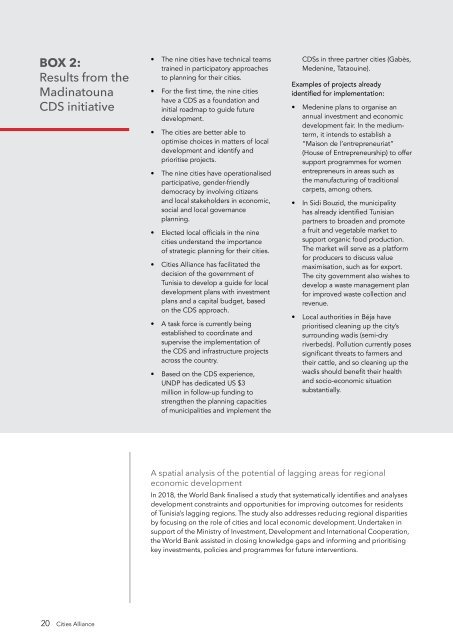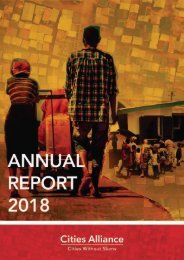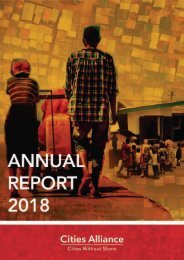Create successful ePaper yourself
Turn your PDF publications into a flip-book with our unique Google optimized e-Paper software.
BOX 2:<br />
Results from the<br />
Madinatouna<br />
CDS initiative<br />
• The nine cities have technical teams<br />
trained in participatory approaches<br />
to planning for their cities.<br />
• For the first time, the nine cities<br />
have a CDS as a foundation and<br />
initial roadmap to guide future<br />
development.<br />
• The cities are better able to<br />
optimise choices in matters of local<br />
development and identify and<br />
prioritise projects.<br />
• The nine cities have operationalised<br />
participative, gender-friendly<br />
democracy by involving citizens<br />
and local stakeholders in economic,<br />
social and local governance<br />
planning.<br />
• Elected local officials in the nine<br />
cities understand the importance<br />
of strategic planning for their cities.<br />
• <strong>Cities</strong> <strong>Alliance</strong> has facilitated the<br />
decision of the government of<br />
Tunisia to develop a guide for local<br />
development plans with investment<br />
plans and a capital budget, based<br />
on the CDS approach.<br />
• A task force is currently being<br />
established to coordinate and<br />
supervise the implementation of<br />
the CDS and infrastructure projects<br />
across the country.<br />
• Based on the CDS experience,<br />
UNDP has dedicated US $3<br />
million in follow-up funding to<br />
strengthen the planning capacities<br />
of municipalities and implement the<br />
CDSs in three partner cities (Gabès,<br />
Medenine, Tataouine).<br />
Examples of projects already<br />
identified for implementation:<br />
• Medenine plans to organise an<br />
annual investment and economic<br />
development fair. In the mediumterm,<br />
it intends to establish a<br />
“Maison de l’entrepreneuriat”<br />
(House of Entrepreneurship) to offer<br />
support programmes for women<br />
entrepreneurs in areas such as<br />
the manufacturing of traditional<br />
carpets, among others.<br />
• In Sidi Bouzid, the municipality<br />
has already identified Tunisian<br />
partners to broaden and promote<br />
a fruit and vegetable market to<br />
support organic food production.<br />
The market will serve as a platform<br />
for producers to discuss value<br />
maximisation, such as for export.<br />
The city government also wishes to<br />
develop a waste management plan<br />
for improved waste collection and<br />
revenue.<br />
• Local authorities in Béja have<br />
prioritised cleaning up the city’s<br />
surrounding wadis (semi-dry<br />
riverbeds). Pollution currently poses<br />
significant threats to farmers and<br />
their cattle, and so cleaning up the<br />
wadis should benefit their health<br />
and socio-economic situation<br />
substantially.<br />
A spatial analysis of the potential of lagging areas for regional<br />
economic development<br />
In <strong>2018</strong>, the World Bank finalised a study that systematically identifies and analyses<br />
development constraints and opportunities for improving outcomes for residents<br />
of Tunisia’s lagging regions. The study also addresses reducing regional disparities<br />
by focusing on the role of cities and local economic development. Undertaken in<br />
support of the Ministry of Investment, Development and International Cooperation,<br />
the World Bank assisted in closing knowledge gaps and informing and prioritising<br />
key investments, policies and programmes for future interventions.<br />
20 <strong>Cities</strong> <strong>Alliance</strong>




